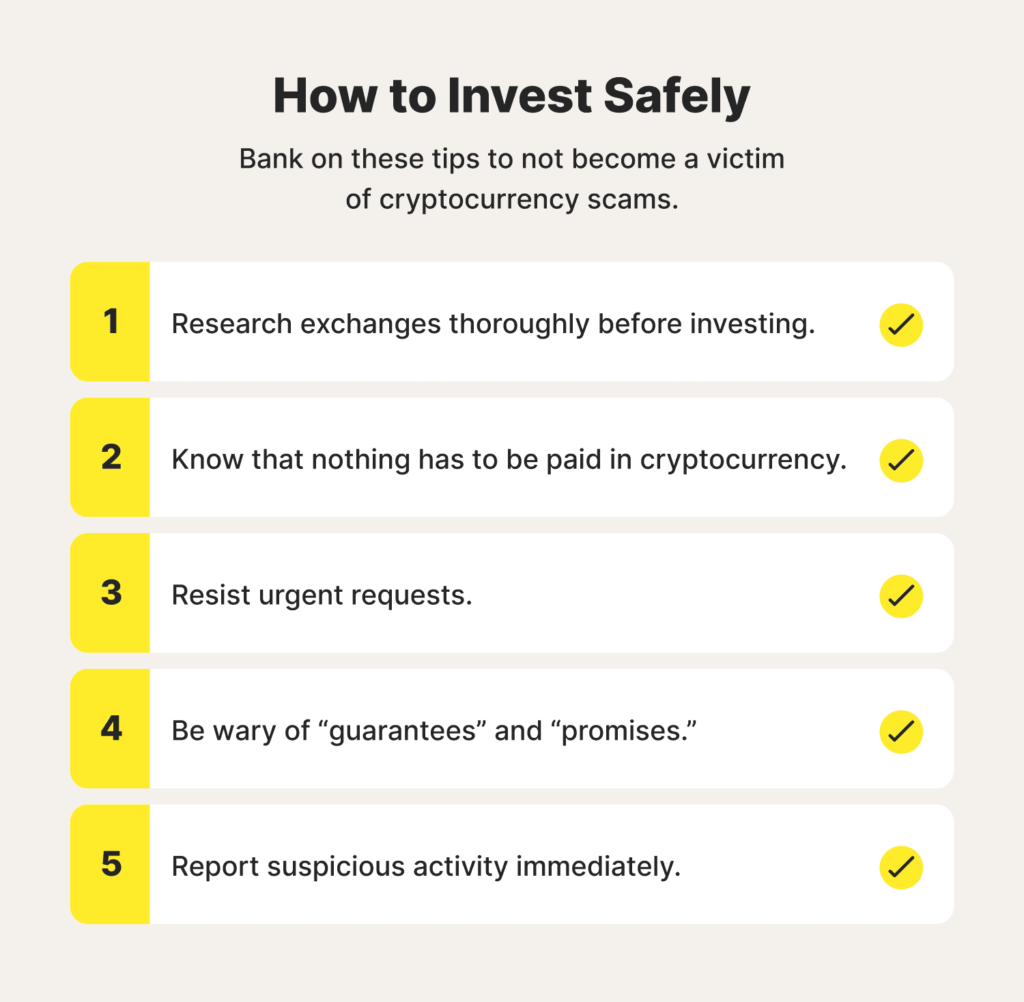In recent years, cryptocurrency’s popularity has soared, yet its newness and complexity make it a hotspot for scammers. The growing concerns about crypto scams lead some to question, “Is Cryptocurrency a Scam?” This query reflects the need for a nuanced understanding of the risks and rewards in this evolving landscape. As digital currencies gain traction, investors must approach the market with vigilance, distinguishing between legitimate opportunities and potential scams. Staying informed and adopting a discerning mindset are crucial for navigating this dynamic space with confidence.
| Next Up In Investing |
| Cryptocurrency: Step by Step Guide for Beginners |
| How Does Cryptocurrency Work? Blockchain Tech |
| What is Cryptocurrency? Basic Definitions |
| How Many Cryptocurrencies Are There? |
What is Cryptocurrency?
Cryptocurrency is a digital or virtual token that uses cryptography to secure its transactions and to control the creation of new units. Cryptocurrencies are decentralized, meaning they are not subject to government or financial institution control.
- Bitcoin, the first and most well-known cryptocurrency, was created in 2009.
- Since then, thousands of other cryptocurrencies have been created, including Ethereum, Litecoin, and Dogecoin.
Cryptocurrencies have been praised for their potential to revolutionize the financial system. They offer a number of advantages over traditional fiat currencies, including:
- Security: Cryptocurrencies are secured by cryptography, which makes them very difficult to counterfeit or hack.
- Transparency: All cryptocurrency transactions are recorded on a public ledger called a blockchain. This makes it easy to track and verify the authenticity of transactions.
- Decentralization: Cryptocurrencies are not subject to government or financial institution control. This makes them more resistant to censorship and manipulation.
Despite their advantages, cryptocurrencies have also been criticized for their volatility, susceptibility to scams, and lack of regulation.
Is Cryptocurrency a Scam?
A cryptocurrency scam is any fraudulent scheme that involves the use of cryptocurrencies. Cryptocurrency scams can take many different forms, but they all share the common goal of stealing money from investors or users.
Why is the Crypto Industry Susceptible to Scams?

There are a number of reasons why the crypto industry is susceptible to scams:
New and Complex Technology
Cryptocurrencies are a relatively new and complex technology. This can make it difficult for investors and users to understand how they work and how to protect themselves from scams.
Lack of Regulation
The crypto industry is largely unregulated. This means that there are few laws or regulations in place to protect investors and users from scams.
Anonymity
Cryptocurrencies can be used to make anonymous transactions. This makes them attractive to scammers, who can use them to steal money and avoid detection.
Common Types of Cryptocurrency Scams

There are a number of common types of cryptocurrency scams. Some of the most common include:
Fake ICOs
An initial coin offering (ICO) is a type of crowdfunding event where a company sells its own cryptocurrency tokens to investors. Fake ICOs are created by scammers who raise money from investors and then disappear with the funds.
Fake Wallets
A cryptocurrency wallet is a software program or hardware device that stores a user’s private keys. Fake wallets are created by scammers to steal users’ private keys and gain access to their cryptocurrency funds.
Crypto Ponzi Schemes
A Ponzi scheme is a type of investment fraud where scammers promise investors high returns with low risk. Crypto Ponzi schemes work by using new investor funds to pay off existing investors. The scheme eventually collapses when there are not enough new investors to pay off the existing ones.
Phishing and Social Engineering Attacks
Phishing and social engineering attacks are used by scammers to trick users into revealing their private keys or other sensitive information. For example, a scammer might send a phishing email that looks like it is from a legitimate cryptocurrency exchange. The email might ask the user to click on a link and enter their login credentials. If the user clicks on the link and enters their credentials, the scammer will be able to access their account and steal their funds.
Pump-and-Dump Schemes
A pump-and-dump scheme is a type of market manipulation where scammers artificially inflate the price of a cryptocurrency and then sell their holdings at a profit. Pump-and-dump schemes are often perpetrated in social media chat rooms and forums.
How Pump-and-Dump Schemes Work
- The scammers acquire a large position in a low-volume cryptocurrency.
- They spread misleading or false information to generate hype and excitement about the cryptocurrency. This drives up demand and price.
- Once the price reaches a peak, the scammers sell their holdings for a profit.
- The influx of sell orders crashes the price, leaving late buyers with major losses.
Cloud Mining Scams
Cloud mining involves paying a fee to rent computing power from a remote data center to mine cryptocurrency. Some cloud mining companies are legitimate, but many are scams that take investors’ money without providing any mining service.
Signs of a Cloud Mining Scam:
- Requires large upfront payments for long contracts (1+ years)
- Claims outrageously high returns with no risk
- Website contains spelling errors or other red flags
- Company has no verifiable track record
Crypto Jacking
Cryptojacking is the unauthorized use of someone else’s computer to mine cryptocurrency. Hackers infect websites or devices with malware that uses the computational resources to mine crypto without the owner’s consent or knowledge.
Blockchain-wide Attacks
Some scams exploit vulnerabilities in blockchain technology itself. These include:
- 51% attacks: Where a single miner gains control of more than 50% of a blockchain’s hash power, allowing them to reverse transactions.
- Sybil attacks: Where a node forges multiple fake identities on a network to manipulate votes in mining pools or consensus models.
- Routing attacks: Exploiting vulnerabilities in blockchain routing mechanisms to intercept transactions or steal funds.
How To Avoid Cryptocurrency Scams

Here are some tips to help investors avoid cryptocurrency scams:
Spot Cryptocurrency Red Flags
- Claims of guaranteed high investment returns
- Unsolicited investment offers
- Pressure to invest quickly
- Unregistered securities
- No minimum investment amount
- Money-back guarantees
Research Before Investing - Check registrations and licenses
- Read whitepapers thoroughly
- Vet the development team
- Join social media groups to gauge community sentiment
Use Trusted Exchanges and Wallets
- Conduct due diligence on any exchange or wallet before use
- Look for well-known, established brands with strong security measures
- Use hardware wallets for storage when possible
Enable Two-Factor Authentication - Add an extra layer of security to protect accounts
- Requires a secondary step to login, like an SMS code
Monitor Investments Closely
- Set price alerts
- Review accounts frequently for unauthorized activity
- Act quickly if fraud is suspected
How To Report Cryptocurrency Scams

If you are the victim of a cryptocurrency scam, report it immediately to limit losses and prevent others from being defrauded. Here are some steps to take:
Report Investment Scams
In the U.S.:
- SEC: www.sec.gov/tcr
- CFTC: www.cftc.gov/complaint
In Canada:
- Canadian Securities Administrators: www.securities-administrators.ca
Report Business Impersonation
- Better Business Bureau Scam Tracker: www.bbb.org
Report Job Impersonation Scams
- Federal Trade Commission: www.ftccomplaintassistant.gov
Report Blackmail Scams
- Contact local law enforcement
- File complaint with FBI Internet Crime Complaint Center: www.ic3.gov
Conclusion – Is Cryptocurrency a Scam
While cryptocurrency scams pose a risk, investors can protect themselves by being cautious and only using regulated exchanges and services. With proper precautions, it is possible to benefit from crypto’s advantages while avoiding schemes devised to steal funds. Exercising skepticism and following security best practices is key to safely navigating the world of digital assets.

